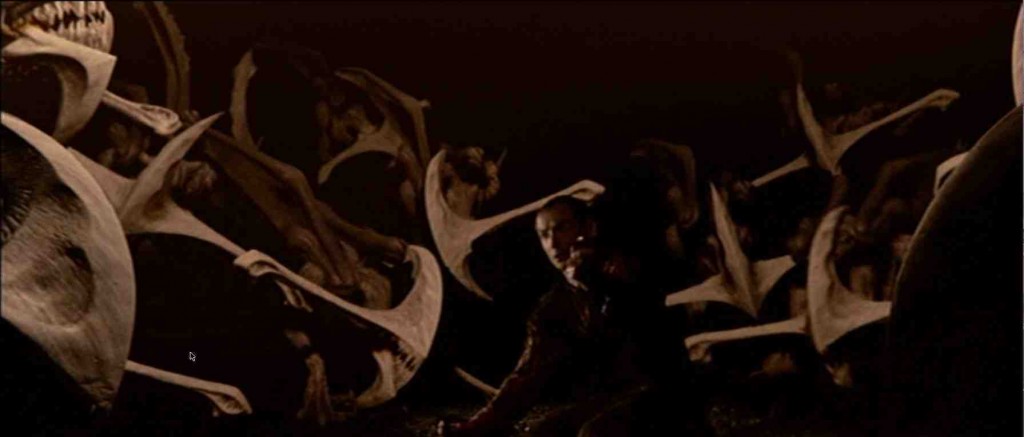




Underrated: Pitch Black
Forgive the lengthy introduction, but this is not the first of these entries I hope to make.
Good science fiction is tough to track down these days. You have horror movies trying to be science fiction (and failing at both), which results in The Happening (only tolerable if you watch with Rifftrax), superhero movies trying to be science fiction (sorry, Will, but Hancock was rough), and science fiction that we all wish wasn’t science fiction (I dare you watch Hayden Christensen in Jumper. Seriously. I dare you.).
Some science fiction tempts you by starting out strong; Event Horizon had great potential and Sunshine was gearing up to be one of the best science fiction films ever made until the last 20 minutes (imagine Episode I disappointment without the suck). And then there are some science fiction films that approach perfection for the entire length of the film and receive the critical praise they so richly deserve (WALL-E and District 9 immediately come to mind).
But this entry is about underrated movies, and I’ve selected to highlight a little film released in 2000 called Pitch Black, the story of a group of passengers marooned on a planet where they struggle to survive on a sun-scorched world. Featuring Vin Diesel, the movie was met with indifference: $39 million at the domestic box office and 36% approval with the Cream of the Crop. The effects are a little dated, no one threatened to sweep the Oscars with their performances, and you won’t find this film on any Top 10 lists.
So what’s to like? What makes this movie so underrated?
THE ACTORS.
With the possible exception of Vin Diesel, no actor or actress stands out in this movie. And, when it comes to science fiction and horror, that can be a good thing. Quick, name me an actor not named Wilford or Kurt in The Thing. Someone not named Sigourney from Alien? Hell, name one actress from The Descent.
A strong story negates the need for a strong performance—everyone just needs to do his/her job. Pitch Black is no different. Because no one takes it over the top, the cast fuses into a plot delivery device that is neither memorable for being good…or for being bad. As a result, the actors disappear and the characters emerge; characters without boisterous secrets or petty dramas, but with personal issues they prefer not be made public. They react to the situation, not the script, and don’t bore us with their petty problems. It is refreshing.
THE PLANET
By far the strength of this movie, the ship crashes on a (seemingly) deserted planet. But this isn’t like most films where the surface is surprisingly like earth except with a slightly higher Nitrogen count or whatever. This is a truly alien landscape, complete with three suns, no water or plant life, and a ringed planet on the horizon. To quote one Ted Mosby, it is hauntingly beautiful, without some bullshit oasis or friendly humanoids to help these survivors out of their bind. There’s only a colony, long-deserted (though not voluntarily).
THE ANIMALS
There are no flora, but plenty of fauna on this seemingly lifeless planet; this ultimately serves as the threat to the population. In a precursor to Peter Jackson’s epic King Kong remake, the creatures themselves have clearly evolved. It’s not one dominant life form, but multiple forms on different parts of the planet. There are the slugs donning exoskeletons and a phosphorescent glow nestled safe in the ground.
The winged, blue-blooded creatures who rule the skies, fighting one another after they’ve run out of torsos:
And the monsters who stalk above the ground, seared by light but immune to everything else (except for Vin, of course).
There is even evidence of other creatures who were clearly not fit to survive long-term on the surface, with huge, hulking skeletons bleached by the suns as a reminder of their downfall due to docility.
And, best of all, this is all information that we gathered as audience members. There isn’t some scientist who’s studied these beasts, some survivor who learned how these brutes think. It’s purely visual evidence, giving us the freedom to construct our own narratives. Subtlety and imagination triumph—Michael Bay fans need not apply.
THE TENSION
Finally, some real tension. Without the stock characters that plague these monster movies, survival becomes a genuine uncertainty. The monsters remain in the dark, where our minds can create far scarier demons than any CGI bullshit. Instead of looking for flaws, we can focus on how the scene unfolds; we replace skepticism with escapism, something that is sorely lacking in most modern horror movies.
Pitch Black won’t change your life and you might not even want to recommend it to your friends. But Netflix it and you just might be pleasantly surprised.
No Tebow
Thankfully, Tim Tebow’s run at the Heisman ended against a wall that is the Alabama defense in which the overhyped, presumed national champion Florida Gators were exposed.
However, my argument isn’t that he shouldn’t win the Heisman. My argument is that he never belonged among the finalists in the first place. It’s a travesty that he’s still being mentioned in the same breath as the 2009 Heisman trophy.
So why shouldn’t he win it?
LET’S TALK CAREER.
Tebow’s career stats are impressive: SEC records for rushing touchdowns and total touchdowns, ridiculously high passer rating, and three national titles.
That’s fine and dandy, but most of those numbers are meaningless this year. It’s painfully obvious why there is a clamor for Tebow to win. He is widely acknowledged to be one of the greatest college football players of all time. Therefore, it seems obvious that the easiest way to demonstrate this achievement would be to be only the second player to win two Heisman trophies. However, while he (sort of) had a case last year, this isn’t it. The Heisman trophy is not a Lifetime Achievement Award, and shouldn’t be handed out because an individual should have won one earlier (e.g., Denzel Washington’s Oscar for Training Day) or because that person deserves something for all their accomplishments (to stick with the Oscar motif, let’s go with Gregory Peck and Al Pacino). Tebow’s past is irrelevant, so let’s not talk about all that he’s meant to college football.
LET’S TALK LEADERSHIP.
Let’s not.
This “intangible” is so incredibly stupid that I can’t believe commentators even mention it, let alone dwell on it. Spoiler alert: Practically every veteran quarterback in college football has strong leadership qualities. Do you think McCoy or Bradford or Kellen Moore or Jake Locker or Darryl Clark or practically any other quarterback at a D-1 school doesn’t lead his team and desperately want to win? Suggesting that Tebow is somehow a “better” leader just because he’s a more visible leader doesn’t make him superior to other quarterbacks, especially not at any significant level that would place him above other players.
His intangibles and his past are meaningless, so only one thing matters: His performance.
LET’S TALK NUMBERS.
When Case Keenum puts up utterly ungodly numbers, he’s dismissed as a “system quarterback.” The same was true last year of Graham Harrell, Texas Tech’s quarterback, and has been an clear concern ever since Andre Ware (system quarterback and horrible announcer extraordinaire) won the Heisman in 1989. And, to an extent, I agree with this; most quarterbacks would put up ridonkulous stats if they were making 50-60 throws per game. That said, these numbers cannot be ignored, especially considering that it was ridiculous numbers that got Tebow the Heisman his sophomore year.
Here’s the thing: Running the spread offense Tebow still put up average numbers, only throwing for over two hundred yards in six games and accounting for less than two hundred yards in three games. Given that the spread allows quarterbacks to jack up their numbers through short passes and bubble screens in lieu of a dominant running game, this is disturbing. Looking at his stats, which should be assisted by the offense that the Gators run, he is still embarrassingly average.
Still, the Heisman is all about the big games. What about those “tough” games against opponents that were good (or at least assumed to be at the time)? Tebow did not have his best games. He threw for 164 yards against “rival” Georgia (rushing for 85 more). The game against Tennessee and Lane Kiffin, who had been talking trash to Florida all summer? Tebow threw for 114 yards and rushed for 76 (on 24 carries). LSU? Tebow threw for 134 yards and rushed for 38 (on 17 carries). Keep in mind that this year was an awful one for the SEC, with two top-ranked teams and a bunch of mediocre pretenders. It’s like the PAC-10 normally looks, and Tebow still failed to dominate.
His “statement game” that was solidifying his Heisman candidacy was a game against Florida State. Florida State. I’m serious.
This might have been one hell of an accomplishment a decade ago, but right now…not so much. When the Gators played Florida State, the Seminoles were ranked “92nd or worse in every key defensive category.” That would put them in-between Hawaii and Colorado State. Good work, Tim– definitely something to brag about. But people still do, pointing to the fact that he has one of the highest passing ratings in college football.
Tim Tebow is one of the most accurate passers in college football history, something that is often touted when talking about his skills. The worst part is that his passing stats (which (again) are not that good) are grossly inflated because of the offense that he runs. Therein lies the double standard – quarterbacks that put up ridiculous numbers in other systems are attacked, but Florida’s system is ignored. Again, it’s not the same as Houston or Texas Tech, but it’s a system nonetheless. He’s running the spread, and that affects his numbers significantly.
Currently, Tim Tebow sits at #8 with a rating of 155.6. And, again, his stats are not that good. Why? Because of a little thing called YAC, which announcers trip one another while trying to be the first to say that it stands for “Yards After Catch.” Suddenly all those bubble screens, swing passes, and shovel passes look less impressive because the receiver is doing all the work.
Unfortunately, YAC stats do not exist for college football. You’d have to find some whackjob who would be willing to jot down the length of the pass for every throw the quarterback makes.
Guess what. You found that whackjob. I did just that for yesterday’s wonderful SEC Championship game.
Now, obviously, this was against Alabama’s wonderful defense, and that definitely affects Tebow’s numbers. But this isn’t about his passing yardage total; I’m only trying to demonstrate the types of passes Tebow makes. Also, obviously, this is one game and cannot be generalized to the entire season. I’m hoping only to draw attention to the kind of offense being run.
I should also mention that a few of these might be off by a yard or two – I used Tivo whenever possible but, at the end of the day, I’m a college football junkie and I was watching the game.
Of Tim Tebow’s 20 completions, 14 (!) of those throws were for four yards or less, and nine of those 14 passes were throws for two yards or less. The receiver takes care of the rest, with roughly 85 yards off of those 14 catches (about six yards a catch). Tebow had one completion where the pass itself was 30 yards; the other five completions were all throws that were 10 yards or less (including the 10-yard throw to Hernandez that resulted in a 59 yard gain to set up Tebow’s interception).
Keep in mind that Alabama’s defense was stifling and the players were clearly prepared for swing passes and shovel passes, and so you have to assume that Florida altered its game plan away from the short throws to try to stretch the field. This lone game is far from conclusive, but it definitely supports a suspicion that Florida’s system is not that far removed from Mike Leach’s offense.
So, no, Tebow’s numbers do not get him into the Heisman discussion. Nor does anything else. Send Mark Ingram, especially after his monster SEC Championship game. Send Toby Gerhart, who has had an unbelievable year (over 1700 yards and he still averaged at least 4.4 yards a carry in each of Stanford’s losses). Send anyone. Just make sure they deserve it.




